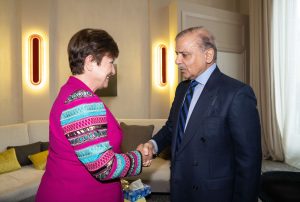The Pulse | Economy | South Asia
The long-awaited package will provide the country, which is in the grip of political and economic crises, with some relief.
Prime Minister Shehbaz Sharif meets with IMF Managing Director Kristalina Georgieva on the sidelines of the Summit for New Global Financing Pact in Paris, June 22, 2023.
Credit: Twitter/Kristalina Georgieva
The International Monetary Fund agreed to provide $3 billion to Pakistan — a long-awaited relief to bail out the impoverished country’s ailing economy.
The nine-month agreement must be approved by the IMF’s Executive Board, which is expected to make a final decision in mid-July, a top IMF official, Nathan Porter, said in a statement late Thursday.
Porter, the IMF’s mission chief to Islamabad, said Pakistan’s economy has faced several external shocks, such as the catastrophic floods in 2022 that killed 1,739 people, caused $30 billion in damage and impacted millions of Pakistanis. The country was also hit by an international commodity price spike in the wake of Russia’s war in Ukraine.
The IMF official said despite the authorities’ efforts to reduce imports and the trade deficit, reserves have declined to very low levels and liquidity conditions in the power sector also remain acute.
“Given these challenges, the new arrangement would provide a policy anchor and a framework for financial support from multilateral and bilateral partners in the period ahead,” the statement read.
Porter said over the past few days, the Pakistani authorities had “taken decisive measures to bring policies more in line with the economic reform program supported by the International Monetary Fund,” including Parliament passing a revised budget.
The proposed package is higher than what Pakistan was expecting. The country was awaiting the release of the remaining $2.5 billion from a 2019 bailout package of $6.5 billion that expires Friday.
There were a lot of uncertainties about what would happen after June, especially with a new government coming to power in a few months, said Mohammad Sohail, a prominent economist and head of Topline Securities.
“Now this funding of $3 billion for nine months will definitely help restore some investors’ confidence,” said Sohail.
The deal between the IMF and Pakistan comes days after Prime Minister Shehbaz Sharif spoke with Kristalina Georgieva, the managing director of the IMF, on Tuesday. The two also met on June 22 on the sidelines of a global finance meeting in Paris.
On Friday, Sharif tweeted that the arrangement will help strengthen Pakistan’s foreign exchange reserves, enable the country to achieve economic stability, and put the country on the path of sustainable economic growth. He said he appreciated the efforts and hard work of Finance Minister Ishaq Dar for achieving the outcome. Sharif also thanked Georgieva and her team at the IMF for their cooperation and collaboration.
Talks between Pakistan and the IMF had stalled in December after the global lender delayed the release of a crucial tranche of $1.1 billion from the bailout originally signed in 2019 by Sharif’s predecessor, Imran Khan.
Pakistan and the IMF have been at odds over what the fund says is Islamabad’s unsatisfactory compliance with the bailout conditions. Pakistan says it has fully complied with the conditions.
The cash-strapped Pakistani government is struggling to avoid a default with financial help from friendly countries such as China, Saudi Arabia, and the United Arab Emirates. It has also been embroiled in an unprecedented economic crisis since Sharif replaced Khan, who was ousted in a no-confidence vote in Parliament last year.


